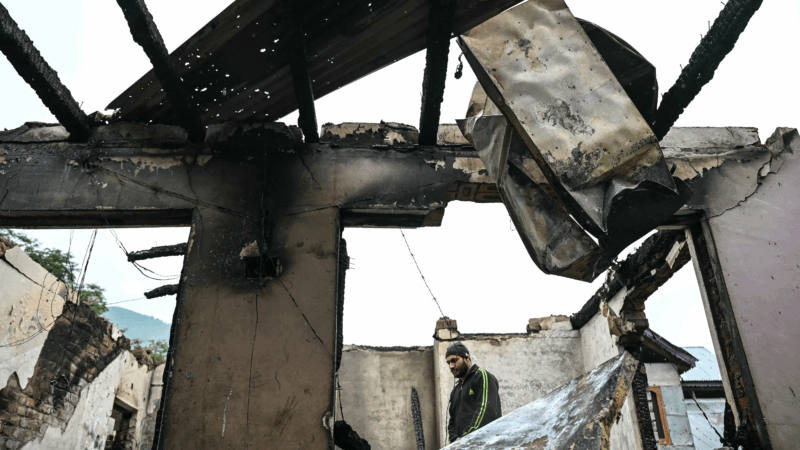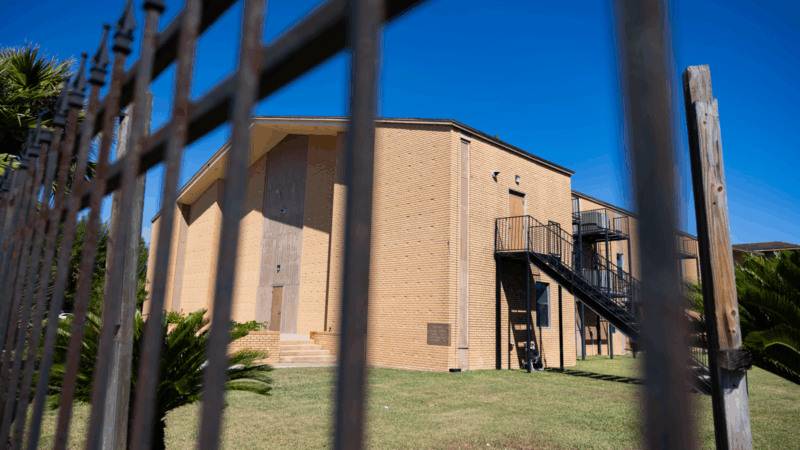India and Pakistan trade attacks amid risk of war between nuclear states
Pakistan’s army said it shot down 25 military drones that fanned over population centers — including the city that houses Pakistan’s general army headquarters.
By Thursday evening, residents in Indian border towns reported hearing blasts. Authorities announced blackouts along parts of the border, and the Secretary of State Marco Rubio had spoken to the Pakistani prime minister and the Indian foreign minister, urging “immediate de-escalation” by both countries.
This followed India’s missile attacks across Pakistan in the early hours Wednesday, in what has been the latest ratcheting of tensions between the two nuclear-armed countries that began with gunmen killing Indian tourists in late April.
“This is a serious, serious provocation,” Pakistani army spokesman Maj. Gen. Ahmed Sharif Chaudhary said of the Indian drones in an English-language statement. “It appears that India has apparently lost the plot. Rather than going on a path of rationality, it is further escalating in a highly charged environment.”
Amid the tensions, the U.S. Consulate General in Lahore, Pakistan, directed its staff to shelter in place. Operations were suspended in Indian and Pakistani airports near their border. School was out in border areas of both Pakistan and India.
Parents on one Pakistani WhatsApp group exchanged emergency checklists that included baby milk powder and coloring books to keep kids busy. “Stay calm, stay prepared. May we all remain safe,” the list concluded.
The escalation began after the killing on April 22
The escalation began after India accused Pakistan of being behind an attack where gunmen killed 26 people, mostly tourists, in India-administered Kashmir on April 22. It was the worst attack against Indian civilians since 2002, and it sparked outrage across India after eyewitnesses reported the gunmen specifically targeted Hindu men. Pakistan denies any connection to the attack. The Himalayan territory is divided between India and Pakistan; both countries claim it in its entirety.

In the early hours on Wednesday, India struck what it called “terrorist infrastructure” across Pakistan, in the most widespread strikes it had conducted against its neighbor since the two sides went to war in 1971. India described the strikes as retribution. Pakistan said the strikes and subsequent shelling killed 31 people, including children. Pakistan’s military said it downed five Indian aircraft, which India did not comment on.
India accused Pakistan of killing 16 civilians in cross-border fire.
“The potential for greater escalation is very high”
On Thursday morning, residents reported hearing the sound of blasts in Lahore, Pakistan’s second-largest city, near an old airport.
Muhammad Abbas, a 47-year-old groundskeeper in an upscale Lahore suburb, was washing a car when he heard a bang. He said “a few people were frightened,” but otherwise, people carried on. “Pakistani people are not cowards who hide in their houses. Whatever happens, will happen to all of us.”
The blasts appeared to be related to one of the drones, which army spokesman Sharif said had “managed to engage a military target near Lahore.” He said four army personnel were injured in that incident.
India’s information ministry said its armed forces “targeted Air Defence Radars and systems at a number of locations in Pakistan,” and added “it has been reliably learnt that an Air Defence system at Lahore has been neutralised.”

By Thursday evening, blasts could be heard above the towns in Jammu, Achabal and Anantnag in Indian-administered Kashmir. An Indian army spokesperson, Suneel Bartwal, told NPR that districts along the line that separates India and Pakistan-controlled Kashmir “have been put on high alert. A blackout is in place.”
Any new development could change calculations on either side, said Ajai Shukla, a strategic affairs commentator and retired Indian army colonel.
“The potential for greater escalation is very high.” Both countries had a deep bench of military capabilities, he said. “They’ve barely touched the surface so far.”
On Thursday, Indian residents piled by the roadside to watch security forces gathered around one fallen projectile in a field in the village of Makhan Windi, some 25 miles from the Pakistani border. The mood was more curiosity than fear.
But in Poonch, a town in Indian-held Kashmir, local resident Narendar Singh said most of his neighbors had fled after Pakistani shelling. Resident Sarfaraz Ahmad Mir said Pakistani shelling overnight killed his cousins, a twin boy and girl aged 11-years-old.
“This shouldn’t have happened,” Mir said. ” They shouldn’t have targeted civilians at all.”
Even as hostilities gripped the public’s attention, human rights activists said Indian authorities had rounded up and detained more than 30 Rohingya refugees from their homes in the Indian capital, including the elderly parents of David Nazir.
Nazir said his wife was spared, because she was pregnant. Nazir said he, and some other Rohingya managed to flee, and slept in a park. A lawyer, Colin Gonsalves, who is representing the detained people, said the government appeared to have taken advantage of the situation to detain the men. Delhi police did not respond to repeated requests for comment.
“All it takes is a miscalculation or a mistake”
In his call with Pakistan’s prime minister, Secretary of State Rubio “expressed U.S. support for direct dialogue between India and Pakistan and encouraged continued efforts to improve communications,” according to a State Department statement.
Praveen Donthi, a senior analyst for India with International Crisis Group, said the international community needed to take the conflict between India and Pakistan seriously.
“Both are nuclear powers. And all it takes is a miscalculation or a mistake,” Donthi said on NPR’s Morning Edition. “Both these powers are not completely in control of the escalation dynamics, which the world seems to believe. So there lies the risk.”

He said Washington had the best chance of ending the hostilities, because of the country’s historic ties with Pakistan, and its increasing closeness to India.
“Ultimately,” he said, “the U.S. is the superpower who can bring both the parties to the table.”
Diaa Hadid reported in Mumbai, India. Bilal Kuchay contributed reporting from Srinagar, Indian-administered Kashmir, Betsy Joles contributed from Lahore, Pakistan, and Omkar Khandekar from Mumbai.
Transcript:
A MARTÍNEZ, HOST:
Indians and Pakistanis had been waiting for – or dreading – this moment.
(SOUNDBITE OF MISSILE STRIKING)
MICHEL MARTIN, HOST:
India struck multiple targets across Pakistan in the most extensive strikes in more than 50 years. It comes after India blamed Pakistan for an attack that killed 26 people in late April. Pakistan denies any connection. Its military has retaliated by firing into parts of Indian-held Kashmir, and it claims it has downed five Indian aircraft. The Associated Press reports that more than 30 people were killed in Pakistan. India says three people were killed on their side.
MARTÍNEZ: On the line with us is NPR’s Diaa Hadid. She covers Pakistan and India from her base in Mumbai. Diaa, tell us about these strikes. They happened overnight there.
DIAA HADID, BYLINE: Yeah. And most people were sleeping, A, but a resident near one of the worst-hit places in southern Pakistan recorded this audio.
(SOUNDBITE OF MISSILE STRIKING)
UNIDENTIFIED PERSON: (Speaking Arabic).
HADID: And even in a nearby town, one resident said the strikes woke up his family. This is Ijaz Rao.
IJAZ RAO: My family wake up, and they say, something is – very strange is happening, that – not just one blast. There were a number of blasts. The windows were shaking.
MARTÍNEZ: Wow. So what kind of places was India targeting in Pakistan?
HADID: Well, India’s army says it struck militant training camps and what they call terror infrastructure. And many of those strikes were in Pakistani-held Kashmir. Kashmir is that Himalayan territory divided between India and Pakistan. It’s claimed by both, and it’s at the heart of nearly every conflict between the two countries. But Pakistan says the strikes mostly hit mosques and part of a hydropower dam. One prominent Pakistani militant says one of the strikes targeted his relatives and killed 14 people, including women and children. That was in a small town in southern Pakistan. And it’s really important to say here where these strikes took place. Some were deep in Pakistan. One was near the country’s second-largest city.
So here have a listen to Michael Kugelman. He writes the Foreign Policy’s weekly South Asia Brief, and he says this hasn’t happened in decades.
MICHAEL KUGELMAN: The airstrikes that India has launched into Pakistan are the deepest into Pakistani territory since 1971. What also stands out about these recent strikes is the scale and intensity of them.
HADID: And analysts I’ve spoken to say they were actually expecting India to hit hard.
MARTÍNEZ: Expecting them? Why were they expecting that?
HADID: Well, just because of the nature of the attack that triggered these renewed tensions. It happened on April 22, when gunmen attacked Indian tourists in a meadow. And it seems some of the gunmen targeted Hindu men. It was the deadliest attack against civilians in years. And the victims came from all over India, so it just really triggered widespread anger. But after the strikes, the Indian military said its response was measured, focused and nonescalatory. Analysts say those words signal that India is not interested in escalating this further.
MARTÍNEZ: Now, could all this maybe quiet down, or do folks there expect more military actions?
HADID: I guess the problem here is with strikes so deep in Pakistan, and with this death toll, Pakistan may feel like it must respond to show people that its army isn’t weak. So analyst Praveen Donthi with the International Crisis Group says other countries have to step in.
PRAVEEN DONTHI: I’m afraid, if the international community doesn’t step in, especially the U.S., then we’re only seeing the beginning of these escalatory strikes.
HADID: For now, President Trump has said he hopes this ends quickly, and Secretary of State Marco Rubio says he’s closely monitoring the situation.
MARTÍNEZ: That’s NPR’s Diaa Hadid in Mumbai. Thank you very much.
HADID: You’re welcome.
Voting nears to a close in Texas primary that may be crucial to control of the Senate
The GOP and Democratic primaries mark a potential litmus test for what direction base voters want their parties to go ahead of midterm elections this fall that will determine power in Congress.
Pregnant migrant girls are being sent to a Texas shelter flagged as medically risky
Government officials and advocates for the children worry the goal is to concentrate them in Texas, where abortion is banned.
The 2026 World Cup faces big challenges with only 100 days to go
Will Iran compete? Will violence in Mexico flare up? And what about funding for host cities in the U.S.? With only 100 days left before it beings, the 2026 World Cup in North America is facing a lot of uncertainty.
A glimpse of Iran, through the eyes of its artists and journalists
Understanding one of the world's oldest civilizations can't be achieved through a single film or book. But recent works of literature, journalism, music and film by Iranians are a powerful starting point.
Mitski comes undone
She may be indie rock's queen of precisely rendered emotion, but on Mitski's latest album, Nothing's About to Happen to Me, warped perspectives, questionable motives and possible hauntings abound.
This quiet epic is the top-grossing Japanese live action film of all time
The Oscar-nominated Kokuho tells a compelling story about friendship, the weight of history and the torturous road to becoming a star in Japan's Kabuki theater.







